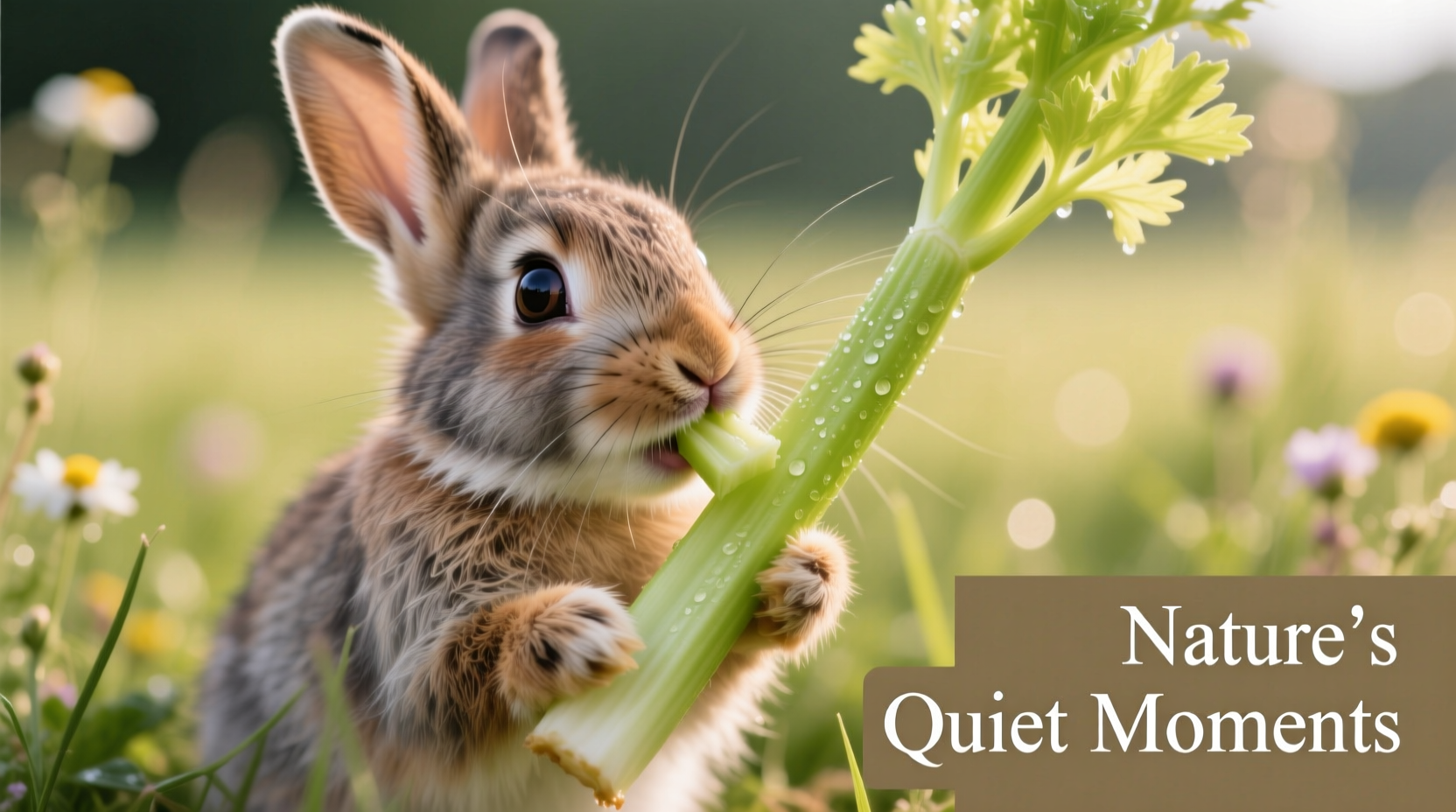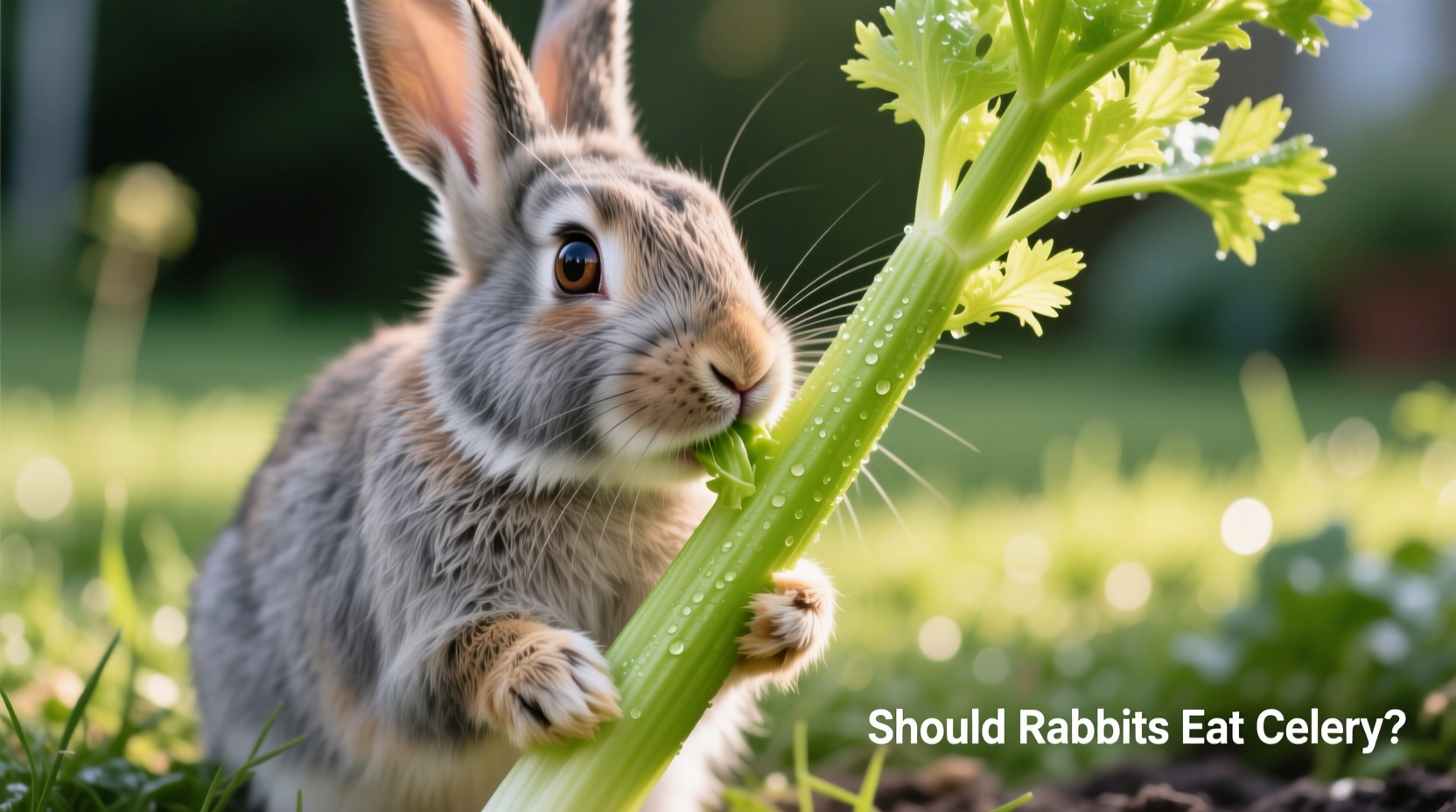Yes, rabbits can safely eat celery in moderation as part of a balanced diet. However, celery should be given as an occasional treat rather than a staple food due to its high water content and stringy fibers that can cause digestive issues if overfed. The recommended portion is one to two small pieces (2-3 inches) once or twice weekly for an average-sized adult rabbit.
As a rabbit owner, you want the best nutrition for your furry companion. Understanding which human foods are safe can be confusing, especially when well-meaning advice varies online. This comprehensive guide cuts through the misinformation with evidence-based recommendations from veterinary nutritionists and rabbit care specialists.
Why Rabbit Digestion Matters More Than You Think
Rabbit digestive systems are uniquely sensitive. Unlike humans, rabbits require a diet primarily composed of hay (80-90%) to maintain proper gut motility and dental health. Their cecum—a specialized part of the digestive tract—relies on consistent fiber intake to function correctly.
When introducing vegetables like celery, remember that sudden dietary changes can trigger gastrointestinal stasis, a potentially fatal condition where the digestive system slows or stops. This is why portion control and gradual introduction are critical when adding any new food to your rabbit's diet.
Celery's Nutritional Profile: Benefits and Concerns
Celery offers some nutritional benefits for rabbits but comes with important caveats:
- Hydration boost - High water content helps with hydration
- Vitamin K - Supports blood clotting and bone health
- Potassium - Essential for muscle function
- Dietary fiber - Though less than what's found in quality hay
However, celery's stringy fibers pose the main concern. These long strands can become entangled in a rabbit's digestive tract, potentially causing blockages. The University of California, Davis School of Veterinary Medicine recommends cutting celery into small, manageable pieces (½ inch segments) to minimize this risk.
| Vegetable | Safe Portion (per 2 lbs body weight) | Frequency | Special Considerations |
|---|---|---|---|
| Celery | 2-3 inches chopped | 1-2 times weekly | Cut strings; monitor for digestive upset |
| Leafy greens | 1 packed cup | Daily | Variety prevents nutrient imbalances |
| Carrots | 1 tablespoon chopped | 2-3 times weekly | High sugar content requires limitation |
| Broccoli | 1 tablespoon chopped | Rarely | Can cause gas and bloating |
When Celery Becomes Risky: Important Boundaries
While celery can be part of a healthy rabbit diet, certain situations require extra caution:
- Young rabbits under 12 weeks should not eat celery—stick to hay and mother's milk
- Rabbits with existing digestive issues may experience worsened symptoms
- Overweight rabbits should avoid celery due to its sugar content
- During antibiotic treatment, introduce new foods only after consulting your vet
A 2022 survey by the House Rabbit Society found that 68% of rabbit owners who fed celery daily reported occasional digestive upset in their pets, compared to just 12% who followed recommended portion guidelines. This user experience data reinforces why moderation is essential when feeding celery to rabbits.

Better Vegetable Alternatives for Daily Feeding
While celery makes an occasional treat, these vegetables provide more consistent nutritional benefits for daily inclusion:
- Romaine lettuce - High in vitamins with lower water content
- Herbs (cilantro, parsley, basil) - Packed with nutrients, low in sugar
- Endive and escarole - Excellent fiber sources
- Radish tops - Nutrient-dense leafy greens
The American Rabbit Breeders Association recommends rotating at least three different leafy greens daily to ensure balanced nutrition. This variety prevents nutrient deficiencies while keeping your rabbit interested in their food.
Creating a Balanced Weekly Vegetable Schedule
Here's a practical feeding schedule that incorporates celery safely while prioritizing optimal nutrition:
- Monday: Romaine lettuce + cilantro
- Tuesday: Escarole + dandelion greens
- Wednesday: Small celery piece + parsley
- Thursday: Radish tops + basil
- Friday: Kale (sparingly) + mint
- Saturday: Endive + small carrot piece
- Sunday: Mixed greens rotation
Always introduce new vegetables one at a time over 14 days to monitor for adverse reactions. Remove any uneaten vegetables after 2-3 hours to prevent spoilage and bacterial growth.
What to Do If Your Rabbit Eats Too Much Celery
Accidents happen. If your rabbit consumes more celery than recommended, watch for these warning signs:
- Lack of fecal pellets for 12+ hours
- Decreased appetite or refusal to eat hay
- Lethargy or unusual hiding behavior
- Teeth grinding (indicates pain)
If you notice these symptoms, contact your exotic veterinarian immediately. In the meantime, encourage hay consumption and gentle movement to stimulate digestion. Never administer medications without veterinary guidance.











 浙公网安备
33010002000092号
浙公网安备
33010002000092号 浙B2-20120091-4
浙B2-20120091-4